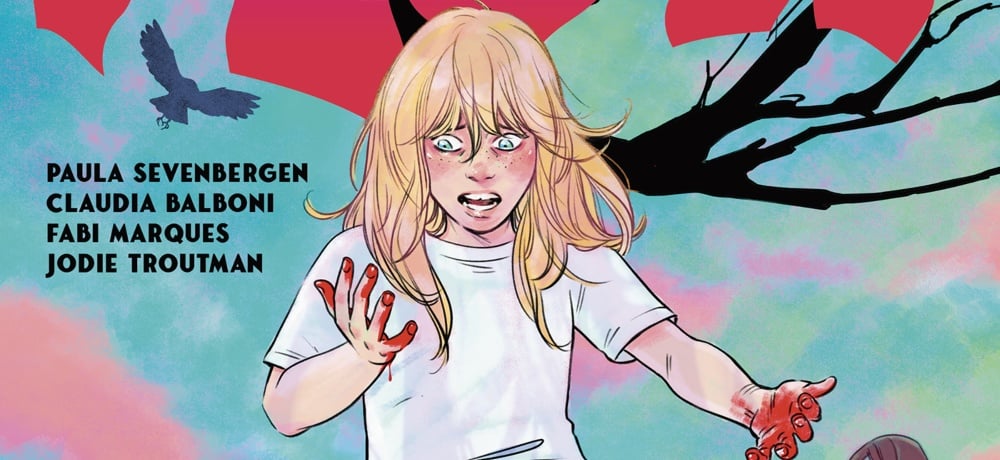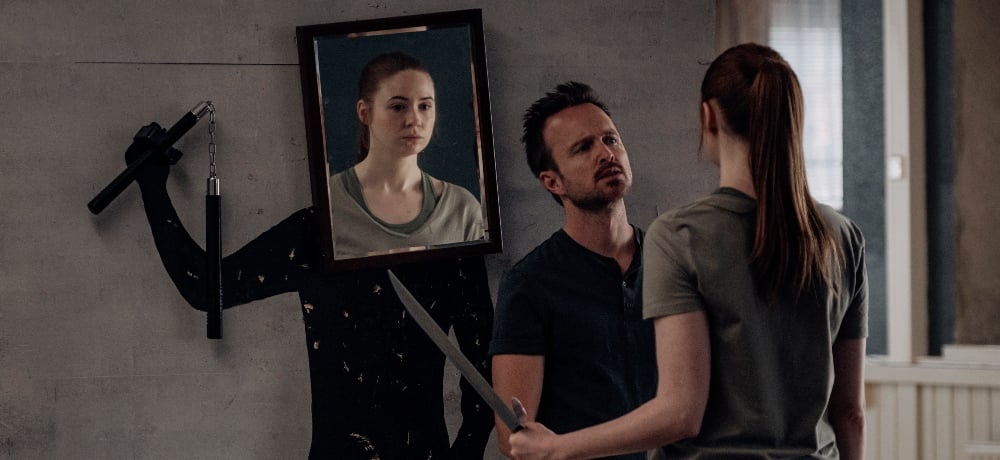






As someone who enjoys understated sci-fi cinema, writer/director Riley Stearns’ Dual was right up my proverbial alley. Stearns’ latest examines some of the ethical and moral dilemmas that come from cloning, but in this instance, it takes a somewhat satirical approach to how it explores just how easy or hard it might be to kill such an entity if you were indeed the person that clone originated from.
The opening of Dual is rather intriguing, as we watch actor Theo James in a fight to the death on a football field with yet another Theo James, all while a bunch of people eagerly watch both Theos figure out the best way to one-up each other and survive the battle. In this world that Stearns establishes for this story, people who are terminally ill can have themselves replicated so that the pain their loved ones will surely experience once they’re dead will be minimalized. That brings us to Sarah (played by the always excellent Karen Gillan), who has very little emotional connection to the world. She can barely tolerate a conversation with her own mother (Maija Paunio), and her boyfriend, Peter (Beulah Koale), travels a lot for work, which often leaves Sarah on her own as it is. But when she receives the news that she has a rare form of stomach cancer and a zero chance for survival, Sarah decides that the best thing to do is to have herself cloned so that her mom and Peter won’t have to grieve her loss.
Once she meets her clone, Sarah is startled when she realizes this new version of herself (also played by Gillan) is just a little bit better at being a human being than she is. As the original Sarah spends what she believes to be her final months imprinting her existence onto Sarah Double (as she’s referred to throughout the film), she’s taken aback by how the clone is slightly more in shape, more sexually adventurous, more free-willed, and able to emotionally connect with her loved ones in ways that Sarah never could. This complicates the shared relationship between the Sarahs in a variety of ways, but things get even more problematic for the O.G. Sarah when she finds out that somehow she’s been able to overcome her illness (I promise that’s not a spoiler, folks), and she has to figure out what to do now that her loved ones actually prefer the clone to her, leaving Sarah questioning everything about her existence in some rather unique ways.
In the world of Dual, the only way to resolve this situation is for the Sarahs to engage in their own duel to the death (there have been some rules established that two iterations of the same person cannot co-exist in these kinds of cases), but for the original Sarah, she struggles with whether or not she’s capable of killing this other version of herself—or if she’s even worthy of being the one who gets to live.
One of the most interesting aspects of Dual is how Stearns approaches the thematic elements of this story. There is a very deliberate matter-of-factness in how the character of Sarah is presented that is coupled with this underlying current of dark comedy, and I could see how, for some, perhaps this presentation approach could be a bit off-putting to some, as it feels like Stearns is almost mimicking the ways that Gillan’s character isolates herself from her mother and boyfriend with her somewhat abrasive nature through his approach to Dual. To me, though, I found this very candid take on mortality and identity rather refreshing, and there was a lot about Sarah that I really related to as well (which may not necessarily be a good thing, but this isn’t a therapy session, so I’ll just work all that out myself).
Gillan is excellent in both of her roles in Dual, and I thought it was interesting to see her often playing against herself in a handful of scenes that I can only imagine wasn’t exactly the easiest of things for the actress to pull off. Another highlight was the arrival of Aaron Paul, who plays Trent, the combat specialist who has to train Sarah to kill her clone and be able to anticipate potential surprises that may arise during their final showdown. Paul is someone whose presence always adds a lot to anything that he’s in, but I think the dynamics of his character, Trent, act as a really fun launch pad for Sarah to become a bit more fully realized as a character as well, and both Gillan and Paul share a great deal of chemistry throughout the scenes they share.
If I have one quibble with Dual, it’s that the story feels like it’s building towards this hugely monumental moment in the end, but the film never quite delivers on that promise, with Stearns taking his narrative into some very unexpected places during the finale that just feel a little undercooked in comparison to everything that preceded them. That being said, life itself often doesn’t play out the ways we think it will, either, so perhaps how things unfold during Dual’s final moments are extremely realistic in that regard, and maybe my feelings towards the conclusion of Dual are more about my own feelings of unfulfillment than the story itself not actually delivering what I think it initially promises us from the get-go.
But as a whole, there’s still so much going on in Dual that I enjoyed immensely, and it’s a film that I haven’t been able to get out of my head since I first saw it, either, which is a testament to how Stearns’ abilities as a filmmaker always push my buttons as a viewer. If anything, we don’t get very many existential sci-fi movies these days, which makes Dual a standout effort in that regard as well.
Movie Score: 3.5/5
---------
Go HERE to catch up on all of our Indie Horror Month 2022 features!
[Photo Credit: Above photo courtesy of RLJE Films.]